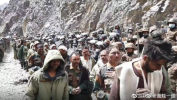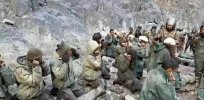walterbibikow
BANNED

- Joined
- Nov 12, 2022
- Messages
- 959
- Reaction score
- -4
- Country
- Location
According to recent reports, concerns of combat stress have plagued the Chinese military due to increasing training and deployment demands.

New Delhi: Chinese soldiers are facing “nervousness, anxiety and fearful emotions” as they undertake unprecedented military activities amid tensions with India along the Line of Actual Control (LAC) and with the US over South China Sea and Taiwan.
Last month, reports in PLA Daily, published by People’s Liberation Army, mentioned that some officers and soldiers were prone to anxiety in intense combat training, and troops needed to learn how to adapt to that pressure to perform in the field.
“The People’s Liberation Army has introduced counselling services, regular assessments and courses to help troops deal with the stress of their assignments and cope in combat,” a report by Hong Kong-based newspaper South China Morning Post said.
Sources in the Indian defence and security establishment pointed out that this mental crisis was something which was expected and the huge stress on Chinese soldiers because of the ongoing crisis at the LAC was visible since they were doing faster rotation of troops, a development which ThePrint had reported last year.
“In our observation, we noticed that the Chinese soldiers were in constant need of medical evacuation and care while being posted at high altitudes and extreme cold which was a first for them. In our assessment, the Chinese were forced to do a faster rotation of troops because the soldiers could not stand long deployment in such extreme conditions,” a source said.
What’s causing the ‘crisis’
Former Northern Army Commander Lt Gen D S Hooda (Retd) agreed and pointed out that it is not a surprise that PLA soldiers had reported stress and other mental health issues.
He said that Chinese President Xi Jinping had himself said that his military suffers from “peace disease”, which is basically lack of combat experience.
“The Chinese have not been exposed to real battle conditions unlike the Indian soldiers. The Chinese have never been deployed in such extreme high altitude conditions and hence these mental health issues are not a surprise,” Lt Gen Hooda told ThePrint.
He said multiple factors like one-child policy, conscription and the fact that the younger population is declining in China has had psychological impact.
Former 14 Corps Commander Lt Gen Rakesh Sharma (Retd) said that the issue the Chinese military is currently facing is not a surprise.
“These kinds of deployment and military activities are a new culture for the Chinese military. They have never been deployed along the LAC in such harsh terrain. They were always posted much behind and amid population and close to cities. Psychological impact is bound to happen when suddenly you find yourself posted in such high altitude where temperatures drop to -50 degrees and the enemy facing you,” Lt Gen Sharma told ThePrint.
He underlined that the Indian soldiers have nearly four decades of experience in fighting high altitude warfare and being deployed in terrible conditions because of Siachen.
“We have our systems in place now and these have been built over the past four decades. The Chinese have just started and this is not something that can be developed over a period of 2-3 years,” the officer, who retired as the Adjutant General of the Indian Army responsible for Human Resource management, said.
He said that the high altitude postings comes with its own psychological and physical issues including losing hair, feeling of impotency and loss of appetite.
“Many of these issues are psychological in nature and the Chinese were bound to face this,” he remarked.
Chinese experts’ studies have frequently demonstrated that at least 25 per cent of PLA personnel experience some type of psychological issue.
It is not just the Chinese army that is facing these issues, but also the Navy and Air Force.
Nearly every day in recent years, PLA airplanes have been flying close to Taiwan and after the visit by US House Speaker Nancy Pelosi to the island in August, drills there reached levels that were previously unheard of.
Some officers and soldiers, according to a story in a Chinese state daily from last month, were vulnerable to anxiety during rigorous combat training.
It was a naval medical University in Shanghai last year that emphasised on the necessity of addressing mission-related stress citing the South China Sea’s strategic significance to China as likely contributing factors. Further research indicated that one in five male sailors serving with China’s submarine force had mental health issues.

 theprint.in
theprint.in

 www.scmp.com
www.scmp.com
New Delhi: Chinese soldiers are facing “nervousness, anxiety and fearful emotions” as they undertake unprecedented military activities amid tensions with India along the Line of Actual Control (LAC) and with the US over South China Sea and Taiwan.
Last month, reports in PLA Daily, published by People’s Liberation Army, mentioned that some officers and soldiers were prone to anxiety in intense combat training, and troops needed to learn how to adapt to that pressure to perform in the field.
“The People’s Liberation Army has introduced counselling services, regular assessments and courses to help troops deal with the stress of their assignments and cope in combat,” a report by Hong Kong-based newspaper South China Morning Post said.
Sources in the Indian defence and security establishment pointed out that this mental crisis was something which was expected and the huge stress on Chinese soldiers because of the ongoing crisis at the LAC was visible since they were doing faster rotation of troops, a development which ThePrint had reported last year.
“In our observation, we noticed that the Chinese soldiers were in constant need of medical evacuation and care while being posted at high altitudes and extreme cold which was a first for them. In our assessment, the Chinese were forced to do a faster rotation of troops because the soldiers could not stand long deployment in such extreme conditions,” a source said.
What’s causing the ‘crisis’
Former Northern Army Commander Lt Gen D S Hooda (Retd) agreed and pointed out that it is not a surprise that PLA soldiers had reported stress and other mental health issues.
He said that Chinese President Xi Jinping had himself said that his military suffers from “peace disease”, which is basically lack of combat experience.
“The Chinese have not been exposed to real battle conditions unlike the Indian soldiers. The Chinese have never been deployed in such extreme high altitude conditions and hence these mental health issues are not a surprise,” Lt Gen Hooda told ThePrint.
He said multiple factors like one-child policy, conscription and the fact that the younger population is declining in China has had psychological impact.
Former 14 Corps Commander Lt Gen Rakesh Sharma (Retd) said that the issue the Chinese military is currently facing is not a surprise.
“These kinds of deployment and military activities are a new culture for the Chinese military. They have never been deployed along the LAC in such harsh terrain. They were always posted much behind and amid population and close to cities. Psychological impact is bound to happen when suddenly you find yourself posted in such high altitude where temperatures drop to -50 degrees and the enemy facing you,” Lt Gen Sharma told ThePrint.
He underlined that the Indian soldiers have nearly four decades of experience in fighting high altitude warfare and being deployed in terrible conditions because of Siachen.
“We have our systems in place now and these have been built over the past four decades. The Chinese have just started and this is not something that can be developed over a period of 2-3 years,” the officer, who retired as the Adjutant General of the Indian Army responsible for Human Resource management, said.
He said that the high altitude postings comes with its own psychological and physical issues including losing hair, feeling of impotency and loss of appetite.
“Many of these issues are psychological in nature and the Chinese were bound to face this,” he remarked.
Chinese experts’ studies have frequently demonstrated that at least 25 per cent of PLA personnel experience some type of psychological issue.
It is not just the Chinese army that is facing these issues, but also the Navy and Air Force.
Nearly every day in recent years, PLA airplanes have been flying close to Taiwan and after the visit by US House Speaker Nancy Pelosi to the island in August, drills there reached levels that were previously unheard of.
Some officers and soldiers, according to a story in a Chinese state daily from last month, were vulnerable to anxiety during rigorous combat training.
It was a naval medical University in Shanghai last year that emphasised on the necessity of addressing mission-related stress citing the South China Sea’s strategic significance to China as likely contributing factors. Further research indicated that one in five male sailors serving with China’s submarine force had mental health issues.

China’s PLA battles ‘mental health crisis’ amid tensions with India, Taiwan
According to recent reports, concerns of combat stress have plagued the Chinese military due to increasing training and deployment demands.
 theprint.in
theprint.in

Mental health – the big stress test for China’s military ambitions
The PLA is expanding its reach and ramping up its technology but the pressure is taking a toll on personnel.











